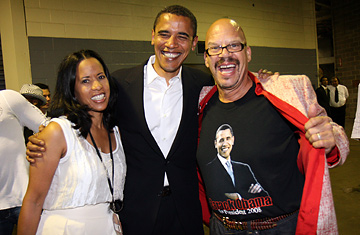
Senator Barack Obama and radio host Tom Joyner (with Essence Communications president Michelle Ebanks) at the 2007 Essence Music Festival in New Orleans
Conservatives like Rush Limbaugh, Sean Hannity and Bill O'Reilly dominate America's talk radio while white liberal voices are mere squeaks on the airwaves. But now syndicated black radio hosts like Tom Joyner, Bev Smith, Michael Baisden and Warren Ballentine and other African-American radio personalities are not only increasingly audible to a wider audience but visible and influential as well. Says April Ryan, White House correspondent for American Urban Radio Networks (AURN): "My phone has been ringing off the hook with Fox News and MSNBC wanting interviews with me. Black radio has always been here, covering the important issues from a black perspective, but it wasn't until Barack Obama, emerged as the first black man to prove himself to be a viable presidential candidate that the mainstream media wanted to hear what we had to say. It's another example of how his candidacy has broken the mold."
Indeed, the contest between Obama and Hillary Clinton for the Democratic presidential nomination has provided black radio with several center stage moments. "When you need the black vote you deal with black radio, and that's what happening," says Ronald Walters, a professor of government and politics at the University of Maryland at College Park.
After the Iowa primary, for example, Hillary Clinton seemed to give President Lyndon B. Johnson, who signed civil rights legislation into law, more credit for progress than Martin Luther King Jr.'s "dream" — a perceived stand-in for Obama's "hope." When that drew negative attention among black voters, Bill Clinton made the rounds defending his wife's statements on more than three syndicated black talk radio programs in one day. "Ironically, the use of black radio by the Clinton campaign has been in giving Bill Clinton airtime to denounce Obama," says Richard Prince, an online media commentator. "During South Carolina this had the reverse effect: turning African Americans against the Clintons."
The critical role of African-American voters during this election cycle has compelled both the Clinton and Obama campaigns to turn to influential black syndicated radio hosts, such as Bev Smith (whose show on AURN claims to reach 25 million listeners) and Tom Joyner (whose Dallas-based syndicated program says it has 8 million listeners every week), in an effort to spread their campaign message. It also helps them with damage control in the aftermath of negative mainstream media coverage, such as the backlash from controversial statements made by Obama's former pastor Rev. Jeremiah Wright.
"For the first time the candidates are using black radio in a significant way — they used to make their black radio rounds during the week leading up to the November election and that was it," says Joyner, a 36-year radio veteran. "The only time that ever came close was when Jesse [Jackson] ran in 1984. This election is forcing the candidates to reach out to the black community and talk about issues that matter to us. We hope that this continues with future elections."
Joyner, by many accounts, is considered an urban industry pioneer. His decision in 1996 to hire former Black Entertainment Television host Tavis Smiley to provide daily political commentary on The Tom Joyner Morning Show was pivotal in raising political activism and awareness among blacks via the airwaves. His endeavors, which continued to gain momentum with both Bill Clinton administrations and the campaigns of Al Gore and John Kerry, have extended this election season to include a free hotline for voters to report poll site irregularities. (Joyner will testify in front of Congress this week on the subject.)
"We [black radio hosts] have an opportunity to be griots, the front person that people turn to and listen to, just like black radio was in the '60s," says Smith, host of the nation's only syndicated African-American nightly talk radio show. She says, "We [in black radio] have been here covering the issues that matter to the black community for many years, but the mainstream media did not come to us. With the emergence of Barack Obama we have been vindicated. His candidacy has put the issue of race into the 21st century much in the same way that it was in the 20th century."
The fact that most black radio hosts, including Ballentine, Baisden and Smith, disproportionately endorse Obama over Clinton, is not surprising, but some industry analysts, including Atlanta-based urban radio consultant Harry Lyles, warn that the practice could potentially become problematic in the long run. "Black radio hosts need to be careful; he's running for President of the United States, not President of black America," says Lyles, who has spent more than 25 years on-air and behind the scenes in radio. "They need to stimulate interest and intelligent discussion about the election, not just cheer on Barack Obama. Being a cheerleader can be very dangerous."
Many black radio hosts say for the time being they're content with enjoying the renewed interest in the political process sparked by the closely contested Democratic race — a trend they hope will continue. "It's the greatest," adds Joyner. "I just hope it lasts; I've been wanting to see people this engaged for years."
